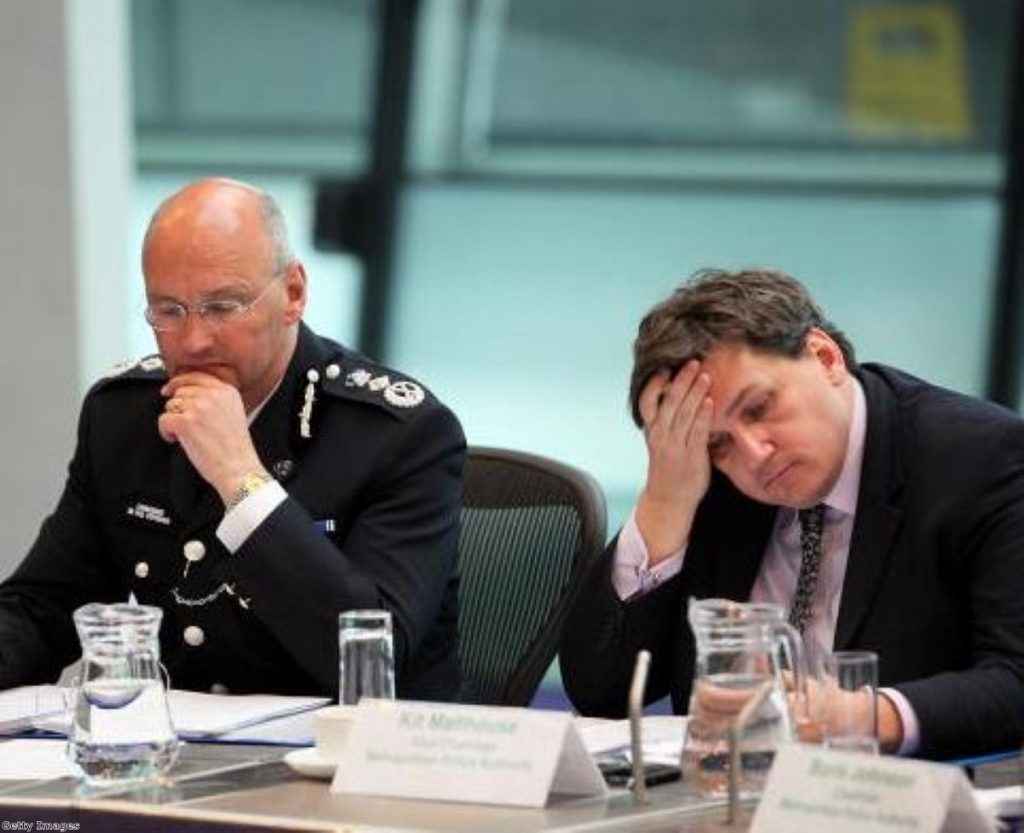Boris deputy told to quit over phone-hacking intervention
By Alex Stevenson Follow @alex__stevenson
Boris Johnson's deputy faces resignation calls after it emerged he sought to cut resources for the Met's phone-hacking inquiry last year.
Former Metropolitan police commissioner Sir Paul Stephenson told the Leveson inquiry that Kit Malthouse, the Metropolitan Police Authority (MPA) chair, had dismissed the ongoing phone-hacking inquiry as a result of "hysteria" among politicians and the media.
Mr Malthouse told him the Met "should not be devoting this level of resources" to Operation Weeting, the phone-hacking probe launched after last year's scandal.
"This amounts to a clear political intervention designed to intimidate the Met into dropping an investigation," Labour MP Chris Bryant said.
"Considering that the investigation has thus far uncovered bribery of police officers by the Sun, mass criminality at the News of the World and a deliberate attempt to pervert the course of justice by News International, both Boris Johnson and Kit Malthouse's interventions show that they are more interested in protecting their cronies than in pursuing justice."
London mayor Mr Johnson had called phone-hacking "a load of old codswallop cooked up by the Labour party" in 2010.
Sir Paul told the Leveson inquiry he did not criticise Mr Malthouse for putting pressure on him, but made clear the intervention had reinforced the "defensive strategy" the Met had adopted in response to anger over phone-hacking.
In his written statement to the inquiry he added: "On several occasions after Operation Weeting had started and I had returned from sick leave, the chair of the MPA, Kit Malthouse, expressed a view that we should not be devoting this level of resources to the phone-hacking inquiry as a consequence of a largely political and media-driven 'level of hysteria'.
"Whilst understanding his desire to maximise the resources devoted to current issues of crime and public safety, I pointed out that the disclosure requirements arising from the civil cases left us with little choice but to invest significant resources in servicing this
matter."
Sir Paul, who resigned in July last year over his relationship with Neil Wallis, a former executive editor at the News of the World, said the Met believed there was a "strong whiff of politics" about the scandal.
Mr Bryant, putting pressure on City Hall with just two months to go until the mayoral election, said Mr Malthouse's position was no longer untenable.
"In any other country this kind of political manipulation would be considered wholly unacceptable and corrupt," he added.
"It is no longer possible for Londoners to have confidence in the Met with Kit Malthouse sitting at the top table. Kit Malthouse should either resign or Boris Johnson should be forced to sack him."
Met on the defensive
This morning saw Sir Paul acknowledge that the Met's approach to the phone-hacking scandal had been flawed during his time as commissioner.
Met officers believed it was "inconceivable" that deputy assistant commissioner Peter Clarke would have missed evidence that more than one journalist at the News of the World was involved in phone-hacking, he argued.
Mr Clarke's probe led to the conviction of the tabloid's royal editor Clive Goodman and private investigator Glenn Mulcaire, but failed to follow up evidence relating to hundreds of other victims.
"The defensive mindset we established was very much based on the flawed assumption that the original investigation was successful in its totality," Sir Paul explained.
"I think we got ourselves hooked on a defensive strategy that we would not expend significant resources without new or additional evidence.
"That was a perfectly logical position to be in providing your assumption around the original investigation was correct."
He conceded: "The investigation in its limitations was a success, but what we didn't do is go back and actually challenge the reasons for those decisions in 2006."
Sir Paul insisted that John Yates, who headed the 2009 investigation, had acted in good faith, but added: "We didn't go back and challenge the reasons. Had we done that… we might have been in a better place."





-01.png)